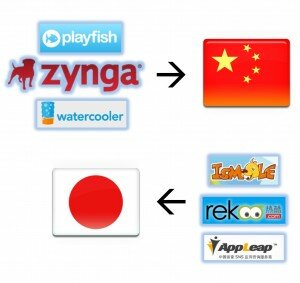Change in Chinaâs Social Games Industry: New Entrants, Markets, and Models
 Chinaâs social games industryâthe players, games, rules, and business modelsâis evolving at a blistering pace. Chinaâs Top 10 Social Games and Top Social Networks, a new report by BloggerInsight, analyzes the latest changes.
Chinaâs social games industryâthe players, games, rules, and business modelsâis evolving at a blistering pace. Chinaâs Top 10 Social Games and Top Social Networks, a new report by BloggerInsight, analyzes the latest changes.
Only a year ago, social games in China were developed by individuals or a small team on a shoestring budget, destined for RenRen (then Xiaonei) or other Chinese networks. Today, buoyed (and pressured) by investment (primarily foreign), developers have formed serious teams and launch their games in more lucrative markets.
The new business model for Chinese developers is to set sights on overseas markets, with Japan as a primary target. Average revenue per user (ARPU) in Japan is up to 12x greater than in China, according to an estimate by Jia Shen, CEO of RockYou. Most Chinese developers see Japan, Korea, Brazil, and Russia as easier markets than Facebook (and head-to-head competition with the like of Zynga), although the Chinese-language Facebook communities in Hong Kong and Taiwan are still good bets. Of course, it wonât be long before the Zyngas of the world also launch in lucrative markets like Japan.
In China, monetization remains a challenge for developers, despite the massive popularity of social games. The combination of low ARPU, powerful networks (read: zero or low revenue share), and an unstable regulatory environment, makes it exceedingly difficult for developers to reap significant profits. For this reason, most foreign developers have not tried launching games in China.
Instead, the top social game firms have come to China for the comparatively cheap and abundant talent. All the big boysâZynga, Playfish, Playdom (rumored), PopCap, Slide, and WaterCoolerâare now present, with several others players eyeing acquisitions. Chinaâs market holds enormous promiseâMMORPGs and Tencent make huge moneymakers via virtual goodsâbut that day has not yet arrived.
The Top 10 Social Games in China
 In terms of the top games, restaurant and pet games are now hot, while a few older hits have fallen off the map. Since the last edition of the report in December 2009, four of the top ten titles have been replaced: Parking Wars, Slave Manor, Animal Paradise, and Small Games. Among the newcomers, three are very localized (Promotion, X-World, and 361° Basketball) while one (Happy Baby) is a knockoff of a Western game.
In terms of the top games, restaurant and pet games are now hot, while a few older hits have fallen off the map. Since the last edition of the report in December 2009, four of the top ten titles have been replaced: Parking Wars, Slave Manor, Animal Paradise, and Small Games. Among the newcomers, three are very localized (Promotion, X-World, and 361° Basketball) while one (Happy Baby) is a knockoff of a Western game.
#1Â Happy Farm
Arguably the first SNS farming game worldwide, Happy Farm, was developed by Five Minutes, a Chinese developer. Its simple âplow, plant, water, pick, and repeatâ formula has since conquered the world. Moreover, the addictive, log-in-every-hour mechanics have spawned countless copycats and variants. Chinese versions are more competitive than their Western counterparts: they allow users to steal and add worms and weeds to friendsâ farms.
#2 RenRen Restaurant
Renren Restaurant is a copy of Restaurant City by Playfish on Facebook. The social network Renren, despite having a mostly open API, had its in-house game developers copy the game almost screen-for-screen. The gameâs relative sophistication (3D graphics, high social interaction) indicates the future of China social games. As Chinese developers become more accustomed to such features, titles will undoubtedly become more original.
#3Â Happy Aquarium
Happy Aquarium = pet game + Happy Farm underwater. Fish games are rapidly growing both in China (Happy Aquarium, Bubble Fish) and on Facebook (FishVille, Fish Isle). In fact, Hong Kong developer 6waves transferred Happy Aquarium to Facebook in Chinese, where it is has enjoyed remarkable success (1.9m DAU, No. 21 game overall). Game themes and mechanics translate across China and Facebook.
#4 Happy Baby (NEW entrant)
Happy Baby is a classic pet game in a cutesy style that copies Playfishâs Pet Society. There are plenty of variants and combinations for the user to create a âdream baby.â One industry insider cited this Happy Baby as the highest-grossing title on RenRen, the biggest open platform for social games in China.
#5 Building One
In Building One, users virtually live, work (e.g., by opening a hairdresser or spa), and socialize together in a single tall tower. Visually, this creates an appealing skyscraper to explore. Stealing customers and coins from other shops is a key part of the game. You can see from the picture you can develop different parts of the building, such as a restaurant with a dining area where you can serve cakes and whatever else you want to cook for your guests. Itâs like a bunch of different simulations in one game.
#6 Promotion (NEW entrant)
Based on a popular Chinese book and film (The Promotion of Dulala), this workplace simulator allows Chinese white-collars to virtually become the star employee they always dreamed of. Users start out poor and lowly, for example with an internship at a fast food company, but can pull themselves up by their virtual bootstraps to become an online Donald Trump. The game has a sharp eye for Chinese humor that appeals to local users.
#7 House-buying
House Buying is the most popular game on Kaixin001, Chinaâs hottest social network. House Buying innovatively combines a real estate section, Happy Farm, a pasture section, and Parking Wars into a single game with a common currency. For example, grow bamboo in your farm to feed pandas in the pasture, which can in turn be sold for cash to pimp-your-house. Because Kaixin001 develops all games in-house, it offers unparalleled integration.
#8 Wonder Hospital
In Wonder Hospital, users heal patients to acquire money and fame. The game includes innovative and controversial ads: a zeppelin flies overhead promoting the Yu Ting brand of contraceptives. Moveover, in-game actions are especially nasty. When visiting a friendâs hospital, players can enforce fines, steal patients, throw rubbish, let a dog loose, park a truck to block access, and âmystery mischiefâ indicated by a bomb icon. This could change as the government âintegratesâ social games into its harmonious society.
#9 361° Basketball (NEW entrant)
361° Basketball is a team-management game that is fully branded by the Chinese sportswear brand 361°. To prepare for âPKsâ against other teams, players train by watching brand videos from the âEquipment Shop,â where they can also buy virtual 361° products.
#10 X-World (NEW entrant)
X-World New York is a game in the style of Mafia Wars! The game has the same âtask listâ mechanics, but the theme is muddled as mafia games are officially banned in China. Itâs one of five new 3rd party games included in Kaixin001âs new open platform experiment.
Kai Lukoff is an analyst at BloggerInsight and an editor on China Social Games. Follow Kai on Twitter
Pages
Categories
- English
- Game Analysis
- game developers
- Publishers
- Social Networks
- Top Social Games
- Uncategorized
- Virtual Currency
Blogroll
Archive
- September 2010
- August 2010
- July 2010
- June 2010
- May 2010
- April 2010
- March 2010
- February 2010
- January 2010
- December 2009
Meta
- Log in
- RSS
- Comments RSS